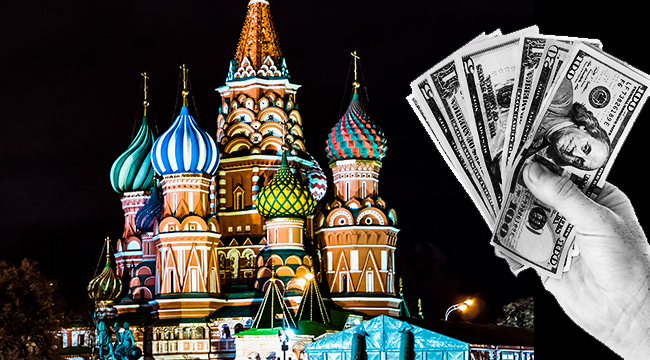
In the Trump/Russia investigation, Robert Mueller’s team has been given the broad authority to investigate any other crimes that “may arise” from their work. That’s taken them into investigating the past of Paul Manafort, and particularly, into the details of international finance. Now, it’s revealed that Mueller’s team is studying closely several suspicious sets of payments from various Russian entities that were originally reported by American banks and timed around key world events such as the 2016 election and Russia’s war with the Ukraine.
A Buzzfeed report details several unusual sets of transactions, such as 30 checks for virtually the same amounts, totaling about $370,000, cashed as soon as they were received back in 2014, and Russia’s ambassador at the time, Sergei Kislyak, received $120,000, which was immediately split in half and wired to two of Kislyak’s personal accounts in Russia. Adding to the suspicious nature, several of the transactions were just below the automatic reporting threshold. If all this sounds familiar, you’re probably a Breaking Bad fan; this activity, in most contexts, would be seen as textbook money laundering, specifically the “placement” aspect.
This would not be the first time the Russian government has allegedly been involved in this financial crime, however. The Magnitsky Act, named for an accountant murdered in Russia’s prison system after uncovering wrongdoing by state officials, has brought new attention to international money laundering as Russian officials named in the act have their assets frozen and are blacklisted from doing business with any US entity. The Russian government has been unusually furious over the Magnitsky Act, and a lobbyist against the act notoriously met with Trump campaign associates in the summer of 2016. If the Russian government is caught violating U.S. sanctions, this will have worrying geopolitical ramifications.
What’s surprising about Buzzfeed’s report is that the Russians fell afoul so easily of not the FBI or another government agency, but the American banking system. When American banks spot unusual spending or deposit patterns, they’re required to file a Suspicious Activity report, and the Russian government uses Citibank, one of the largest financial institutions in the world. One expects, say, meth dealers not to bother looking up what banks do when you walk in the door with a few thousand dollars you claim fell off the back of a truck. Yet in the case of world governments that operate spy rings, it’s odd that they’re not at least checking the paperwork.
It’s not clear yet the nature of these transactions, and it may well never be. Much of the money was turned into cash, and cash has a tendency to simply disappear. But it’s yet another question raised as Russia’s behavior in the United States comes under more and more scrutiny.
(via Buzzfeed)
